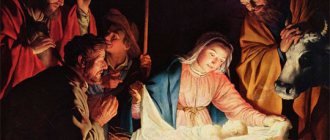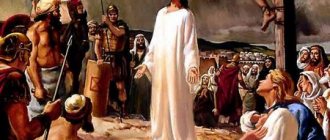Everything came into being through Him.
The Apostle John said, “All things were made through Him, and without Him nothing was made that was made” (John 1:3). This verse is, of course, talking about God. This means that Satan was a creation of God, just like everything else. According to John, there is no other way of existence.
God created both Satan and Jesus, and in that respect they are brothers. This also means that everyone who has ever lived is a brother or sister to everyone else, since we are all children of God. The fact that Jesus and Satan are brothers does not in any way degrade Him, any more than it degrades us to be related to every sinner who has ever lived on earth.
But didn't Jesus defeat Satan on the cross?
⇐ PreviousPage 79 of 98Next ⇒
To conclude this discussion of the first myth about the supposed war between God and Satan, I would like to analyze the following catchphrase: Jesus defeated Satan on the cross. But nowhere does Scripture actually say that Jesus defeated Satan on the cross.
When it is said that Jesus defeated Satan on the cross, it sounds as if Jesus was fighting Satan and implies that God is not omnipotent and Satan was not yet under God's complete control at that point. The Bible gives several accounts of what happened when Jesus gave His life at Calvary. For example, Scripture says that by his death Jesus “made void him that had the power of death” (see Hebrews 2:14-15).
To what extent did Jesus remove Satan's power? It is clear that Satan still has some power, otherwise the Apostle Paul would never have written: “The whole world lies in evil” (1 John 5:19). According to Heb. 2:14-15, Satan was stripped of his authority over the “power of death.” What does it mean?
Scripture speaks of three types of death: spiritual death, physical death, and the second death.
As we learned in the previous chapter, the second death (or eternal death) is spoken of in Rev. 2:22; 20:6,14; 21:8, and this is the time when those who do not believe will be thrown into the lake of fire.
Physical death occurs when a person's spirit leaves his body and it ceases to function.
Spiritual death describes the state of the human spirit that has not been born again by the Holy Spirit. The spirit of a spiritually dead person is removed from God, his spirit carries a sinful nature, his spirit is to a certain extent united with Satan. Eph. 2:1-3 gives us a picture of a spiritually dead man:
“And you, dead in your trespasses and sins, in which you once lived, according to the course of this world, according to the will of the prince of the power of the air, the spirit that is now at work in the sons of disobedience, among whom we all once lived according to our fleshly lusts, fulfilling the desires of the flesh and thoughts, and were by nature children of wrath, like others.”
Paul writes that the Ephesian believers were previously dead in their trespasses and sins. Naturally, he did not mean physical death, since he wrote to physically living people. Therefore, he meant that they were dead in a spiritual sense.
What killed them spiritually? Their “crimes and sins.” God told Adam that when he disobeyed God, he would die (see Gen. 2:17). God did not mean physical death, but spiritual death, because after Adam ate the forbidden fruit, he did not die physically. He died spiritually that day, and physical death came only a thousand years later.
Continuing his thought, Paul says that the Ephesians, being spiritually dead people, walked (that is, lived) in trespasses and sins, “according to the way of the world” (that is, living like everyone else) and obeyed the will of “the prince of the power of the air.” "
What is this “prince of the power of the air”? This is Satan, who rules as commander-in-chief over his evil spirits living in the atmosphere. These evil spirits are listed by rank in the last chapter of Ephesians (see Eph. 6:12).
Paul said that this dark prince is the spirit “now at work in the children of disobedience.” The expression “sons of disobedience” is another synonym for unbelievers, emphasizing their sinful nature. Paul says that by nature they are “children of wrath” (Eph. 2:3). In addition, he emphasizes that Satan is at work in them.
Daddy Devil
Whether they realize it or not, unbelieving people follow Satan and are his subjects in the kingdom of darkness. In their spiritually dead spirit resides its evil, selfish nature. In fact, Satan is their spiritual master and father. This is why Jesus said to the unsaved spiritual leaders, “Your father is the devil; and you want to do the lusts of your father” (John 8:44).
This is a grim illustration of a man who is not born again! Spiritually dead, he goes through life filled with a satanic nature, inexorably approaching physical death, which he is terribly afraid of. And whether he realizes it or not, one day he will face the worst of all deaths - eternal death, and will be thrown into the lake of fire.
It is very important for us to understand that spiritual, physical, and eternal death are manifestations of God's wrath against sinful humanity, and that Satan plays a part in all of this. God allowed Satan to reign over the kingdom of darkness and over those who “loved darkness” (John 3:19). This is what God said to Satan: “You can hold in your power those who do not obey me.” Satan became an obedient instrument of God's wrath against rebellious humanity. Since all have sinned, all are under the authority of Satan, bearing his nature in their spirit and being in his captivity to do his will (see 2 Tim. 2:26).
Ransom for release
But we are grateful to God for the mercy shown to humanity, thanks to which everyone has a chance to get out of their deplorable condition. Because Jesus' substitutionary sacrifice satisfied the demands of divine justice, all believers in Christ can escape spiritual death and satanic captivity because they are no longer under God's wrath. When we come to faith in Jesus Christ, the Holy Spirit comes into our spirit and eradicates the satanic nature from it, thus producing the new birth (see John 3:1-16) and allowing us to become partakers of God's nature (see 2 Pet. 1:4).
Now let's go back to the question asked earlier. When the author of Hebrews wrote that Jesus “by death destroyed him that had the power of death, that is, the devil,” he meant that the power of spiritual death, by which Satan enslaves every unsaved person, is destroyed in the lives of all who are “in Christ.” . We have been made spiritually alive because Christ paid the price for our sins.
Moreover, since we are no longer spiritually dead, we no longer need to fear physical death, for we know that a glorious, eternal inheritance awaits us.
And finally, thanks to Jesus, we are delivered from the second death, that is, from the danger of being thrown into the lake of fire.
Did Jesus defeat the devil on the cross? No, because there was no battle between Jesus and Satan. However, Jesus removed Satan's power over spiritual death, which he uses to keep unsaved people captive to sin. Satan still has the power of spiritual death over unsaved people, but as far as Christians are concerned, he has no power over them.
⇐ Previous79Next ⇒
Recommended pages:
Who is Satan and how did he become who he is?
To fully understand this, it is necessary to consider some points. First, who is Satan? How did he become who he is today? The Bible only says a little about this:
How you fell from the sky, Lucifer, son of the dawn! crashed to the ground, trampling the nations. And he said in his heart: “I will ascend into heaven, I will exalt my throne above the stars of God, and I will sit on the mountain in the assembly of gods, on the edge of the north; I will ascend above the heights of the clouds; I will be like the Most High” (Isaiah 14:12-14).
From this we learn that Satan once lived in heaven, but then fell. Latter-day Saint teaching includes additional information on this topic.
Creator of our spirits
Before we were born, we lived with Heavenly Father, the Creator of our spirits. Even though we didn't have bodies, each of us had a personality. We learned, developed talents and interests, and began to grow into the people we are today. We had free will - the right to choose. Some of us made good choices, others didn't, just like we do on earth.
When we reached the limit of our development, God created the earth for us so that we could live away from Him for some time. On earth we were given physical bodies and a chance to see if we would choose to follow God when He was not around.
The plan He provided for us before He came to earth explained that we would make mistakes, and so He would send us a Redeemer who would willingly give His sinless life to atone for our sins. Jesus Christ offered to become the Redeemer.
Jesus was the eldest Son of God, the first created Spirit, and therefore our eldest Brother. God told us that on earth we will have freedom in the decisions we make, but He expects us to find the truth and live by it. Jesus had to “make up the difference,” that is, He had to do what we could not do for ourselves. He had to atone for our sins, which we could not do ourselves, being sinners.
Satan's plan
Satan didn't like the plan. He tried to convince us to change it. He provided his plan in which we were to come to earth, give up our freedom of choice, and allow it to control our actions and thoughts so that we would not have the opportunity to sin. This would make life on earth meaningless in terms of learning and growth. In return, he wanted to rise above God, as Isaiah says. Jesus, on the other hand, wanted God to get all the glory.
Each of us could choose whether or not to accept God's plan. Satan was cast out of heaven, which is what Isaiah means when he says that Lucifer fell from heaven, and why Satan is called a fallen angel. Those who rejected Heavenly Father's plan were also cast out of heaven to follow Satan forever.
Some believed that God might not have created Satan because he was a sinner. However, God did not create a sinful person. Satan, like all other sinful people, made a personal choice. God created each of us with a spark of divinity within that we can accept and develop or reject.
We cannot blame God if we ourselves choose to neglect the great gifts He has offered and instead choose to live a selfish and greedy life.
Satan tries to tempt Jesus
Jesus Christ was taken by God into the desert for fasting and prayer. After forty days of fasting and prayer, Satan came to Him and tried to nullify the mission of the Savior. He knew that if Jesus Christ sinned, He would not be able to fulfill His role as Savior.
Satan prefers to attack us where we are weakest. Knowing that Jesus was hungry, he invited Jesus to turn stones into bread, to which He responded by quoting from Scripture:
It is written: Man shall not live by bread alone, but by every word that proceeds from the mouth of God (Matthew 4:4).
Next, the Spirit lifted Jesus onto the temple spire. This time Satan tried to exploit His ego by saying that if Jesus really was God, He could throw himself down, trusting the Angels to catch Him. He even quoted a Scripture verse to make it sound more convincing, but he couldn't fool Jesus with it. Christ knew that the Scriptures could be twisted for evil purposes. He, in turn, quoted the verse, reminding Satan that we should not tempt God.
Then the Spirit took Jesus to the top of the mountain, and this time Satan tried to use greed as his weapon. He offered Jesus material wealth if He would worship him.
It seems that Jesus is a little bored with this routine. He told Satan to go away and again quoted the scripture verse that says we should worship only God.
Satan gave up and left, and the Angels began to serve the Lord.
If you read this story in a regular Bible, you will notice some discrepancies with what is said here.
Read the story of Jesus' temptation by Satan as translated by Joseph Smith. Although Mormons use the main translation of the Bible (English-speaking members use the King James Version of the Bible), they sometimes turn to modern revelation for clarification. Before his assassination, Joseph Smith was working on a new translation of the Bible, which was not completed. Mormons do not replace the main translation of the Bible, but do include additional translations in cross-references.
The changes seen here are much more logical and more consistent with what we know about God and the Gospel than the accepted translation. We should not expose ourselves to spiritual danger, and therefore we would never go to a place where our eternal prosperity is at risk. For example, we wouldn't go to a party where there were drugs. Jesus, being perfect, would not have gone to the mountain to be tempted there, deliberately putting Himself in danger. According to the Joseph Smith Translation, He went there to fellowship with God: to pray, fast, and strengthen Himself for the mission ahead.
According to Joseph Smith, it was the Spirit, not Satan, who carried Jesus to where He needed to go. We should never go where Satan is leading us, and if we find ourselves in spiritual danger, we need the Holy Spirit to be with us. Jesus, being perfect, did not follow Satan - Satan simply invited himself on this journey.
Satan used three main weapons against Jesus Christ: physical desires or needs, self-love, and greed. These things tempt many people in the world today, and are powerful weapons in the hands of Satan. Not only did Jesus not give in to temptation, but He also set an example for us to behave when Satan comes to us with an immoral proposal. He quoted the Scriptures and defied temptation.
In order for Jesus to turn stones into bread, He would have needed to use the priesthood. Jesus knew that His priesthood should never be used for personal gain. Mormons bestow the priesthood upon all worthy boys and men twelve years of age and over, but they may never use it for themselves. If they need to participate in a rite, the rite is performed by other priesthood holders. Their priesthood is purely an opportunity to serve others, not an opportunity to use it for personal gain. Therefore, Jesus did not use the priesthood to feed Himself. Just as He did not want to test God by jumping from the top of a mountain and demanding salvation from His own stupidity. We are expected to make decisions using all the wisdom we have. If we deliberately put ourselves in danger, we cannot expect God to save us.
The world often calls us to worship Satan. When we place worldly standards above divine ones, we are, in a sense, worshiping Satan. When we are plagued by the temptations of the world, we need to follow the Savior's example: fast, pray, study the Scriptures, and send Satan away.
The following two tabs change content below.
- Bio
- Latest Posts
Elya
Elya lives by the principle: life is not about the days that have passed, but about those that are remembered. She enjoys children's laughter, evening walks with her family, the smell of rain, Welsh Corgis and popsicles with raspberry jam. Elya lives with her husband and four children in Orem, Utah.
Latest posts by Elya (see all)
- This experiment changes the meaning of the phrase “standing in holy places” - August 24, 2019
- Why Feelings of Uselessness are Meaningless - May 18, 2019
- Recognizing our feelings: anxiety or prompting of the Spirit? — 4.May 2019
Tags: jesus christ, temptations, satan
The Fall of Satan
After all, this is what caused the fall of Satan. He could have become a righteous and great spiritual leader if he had made wise decisions in his premortal life, using his talents and abilities for the sake of good and helping others. But he made a different choice. He wanted to receive all the glory and honor so that he could be exalted above Heavenly Father. Having not received this opportunity, he is now trying to increase the number of his followers, not because he loves us like God and Jesus Christ, but because he is greedy and wants power. Unfortunately, today even those who rejected him in the premortal world choose to follow him. They too had a spark of divinity at creation, but they chose a sinful life.
From the scripture references we have, including John, we see that God did create Satan. Thanks to Isaiah, we know that Satan once lived in heaven. These two facts make it obvious that Jesus and Satan are indeed spiritual brothers, and since God created all spirits, we too are their brothers and sisters. As we develop and grow in mortal life, it is very important for us to follow our older brother Jesus and not Satan. We can, like the Savior, become what God wants us to be, or we can follow Satan, destroying all the great gifts God has given us.
Jesus the devil is the Jewish idea of Jesus.
Jesus the devil is the Jewish idea of Jesus. All Christian encyclopedias, dictionaries, works, books say that Jesus is “Lord”, “good shepherd”, “High Priest”, “King”, etc.
However, this is only the opinion of Christians - “one side of the coin.” But in the Gospels, Toledot Yeshua also talks about the opposite point of view - Jewish, Greek. This point of view is carefully hushed up and hidden by Christians. So in the Brockhaus Biblical Encyclopedia. Article Names of Jesus". Paderborn, 1999. See https://www.hope-church.cc/enziclopediya/index-en.h... only positive names are listed: “high priest”, “king”, “prophet”, “ the good shepherd”, “light of the world”, etc. and the negative ones are kept silent and not mentioned at all.
However, even the disciples of Jesus, who deified Him and wrote the Gospels, could not hide the fact that Jesus was also called:
“THE DEVIL, THE DEMONS” (Mark 3.22 Matthew 12.24 John 7.20 John 10.20, John 8.48, 52
“He has an unclean spirit” Mark 3.30
“VILLAIN” John 18.30. Luke 22.37. Mark 15.28.
"THIGHBOR" Matthew 26.55
"REBEL", (Mark 15.7),
“THE SINNER”, John 9.24
“ILLITERATE” Jesus did not study John 7.15
The world hates me John 7.7 “THE DECEIVER” He deceives the people John 7.12
His brothers did not believe in him John 7.5
“DESPERTER OF THE PEOPLE” (Luke 23.2),
“PIG” - The Pharisee was surprised to see that Jesus did not wash his hands before eating. Luke 11.38
"IMPOSTER" (John 8.13),
"MADMAN" (Mark 3.21),
“BLASPHER” (Mark 2.7. 14.64; Matthew 9.3),
ANATHEMA John 9.22
“HERETICK” Acts 24.5 (Tacitus, Suetonius, Pliny the Younger. Lucian, Celsus),
“SECTANT” (Tacitus, Suetonius, Pliny the Younger. Lucian, Celsus)
“DRINKER, GLORIOUS” “Jesus loves to eat and drink wine, a friend of publicans and sinners” Luke 7.34 Matthew 11.19 This is confirmed by the following quotes:
“The scribes who came from Jerusalem said that He (Jesus) had Beelzebub (the DEVIL) in Him and that He cast out demons by the power of the prince of demons” Mark 3.22
“The Pharisees... said: He (Jesus) casts out demons no other way than by the power of Beelzebub (the DEVIL), the prince of demons” Matthew 12.24.
“The people said, “Is there not a DEVIS in You (Jesus)?” John 7.20.
“They answered and said to him (Pilate), If He (Jesus) had not been a WICKED, we would not have delivered Him to you” John 18.30.
“I tell you that this which is written must also be fulfilled in Me: “And I am numbered with the VICTIMS” Luke 22.37. “The word of the Scripture was fulfilled, “And (Jesus) was numbered with the VICTIMS” Mark 15.28.
“Jesus said to the people, “It is as if you had come out against a thief with swords and staves to take me” Matthew 26.55.
“There was a man in chains (prison) named Barabbas, with his accomplices, who, during the REBELLION (Jesus’s expulsion of the merchants from the temple), committed murder” Mark 15.7
“The elders of the people, the chief priests and the scribes... began to accuse Him, saying: We have found that He (Jesus) is corrupting our people (DESPERTER OF THE NATION),... calling Himself Christ.” Luke 23.2
“Jesus spoke again to the people and said to them, “I am the light of the world; whoever follows me will not walk in darkness, but will have the light of life. Then the Pharisees said to him: You testify about yourself, your testimony is not true (IMPOSTPOST)” John 8.12-13.
“His neighbors (!) went to take Him (Jesus), for they said that He (Jesus) had lost his temper (CRAZY)” Mark 3.21
“The high priest asked Him and said to Him: Are you the Christ, the Son of the Blessed One? Jesus said: I; …Then the high priest tore his clothes and said, “What more need do we need of witnesses?” You have heard blasphemy (BLASPHERE); what do you think? They all found Him guilty of death.” Mark 14.61-64.
Contemporaries of the first Christians (non-Christians) were also critical.
“Non-Christian writers treated Christianity either with indifference, like Flavius, Josephus (37-100), or with hostility, like Tacitus (58-117) and even Pliny (62-114), or, finally, with contemptuous irony, like Lucian (120-190) and Celsus (2nd century)"
All of them (Tacitus, Suetonius, Pliny the Younger. Lucian, Celsus) unanimously wrote about Christianity as “a harmful, disastrous superstition, a criminal SECT... harmful and criminal fanatics and irreconcilable enemies of the social order” Source: Bobrinsky. A. Testimonies of non-Christian writers of the first and second centuries about our Lord Jesus Christ and Christians. Wedge. 2002 (pp. 24,31,35,36,49).
They ceased to accept sound doctrine, but according to their own desires they chose for themselves a teacher (Jesus), who has itching ears (2 Timothy 4.3)
See also:
Accusations against Jesus and the apostles.
Why don't the Jews recognize Jesus as the Messiah? 25 rabbis answer.
Israeli TV, CRITICISM OF CHRISTIANITY. (10 videos 2010)
Is Jesus the Messiah? Problems of Judeo-Christian dialogue.
A correct understanding of the history and tragedy of Jesus, Christianity, the problems and tragedy of the relationship between Judaism and Christianity is impossible without knowledge of opposing points of view.









